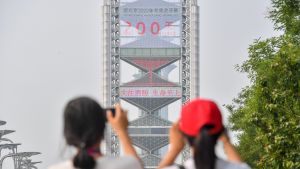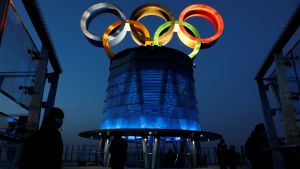Global Polls Find Publics Split on Beijing Boycott

Does a diplomatic boycott of the 2022 Beijing Olympics have public support among countries doing so? Data show modest support—and skepticism.
The 2022 Beijing Olympics open this Friday, February 4, and will be a different Olympics than those of the past. Taking place within tightly-controlled bubbles and without ticket sales, they will also feature something not seen since the 1984 Los Angeles Games: an Olympic boycott.
This year, the United States is among a number of countries around the world staging a diplomatic boycott: they will send their country’s athletes to compete in the Games, but no government officials will attend. The United States was the first country to announce a diplomatic boycott over human rights abuses inside China, particularly those in Xinjiang. Joining the United States are Australia, the United Kingdom, Canada, Denmark, the Netherlands, and Lithuania. Japan will refrain from sending a government delegation, though Japanese officials have stopped short of calling the decision an official boycott. German foreign minister Annalena Baerbock also announced she would not attend the Games, but said this was a personal decision, not a government boycott.
Do these boycotts reflect a popular base of support? In some cases, yes—though it’s limited. Publics in these countries are often divided, and significant portions give a “don’t know” response to questions about a boycott.
Canadians Narrowly Back a Boycott
In a November 26-29, 2021 survey, Canadian polling firm Angus Reid finds that a narrow majority of Canadians (53%) support a diplomatic boycott of the Games. Fewer (40%) support an athlete boycott, and only 37 percent back a fan boycott (though no foreign fans, Canadian or otherwise, will be allowed to attend the Beijing Games in person). However, few Canadians (22%) believe that Canada’s actions will change the PRC’s behavior; most (73%) agree with the statement that “it’s unrealistic that anything Canada does will change China’s behavior.”
One underlying factor clearly affecting Canadian views of a boycott: deeply negative views of China. In Canada, only 16 percent of Canadians say they have a favorable view of China, down from 48 percent in 2017. And those Canadians with an unfavorable view of China are far more likely to support a boycott.
Australians Narrowly Oppose One
The 2021 Lowy Poll found that while Australian attitudes toward China have turned sharply more negative in recent years, that doesn’t necessarily translate into support for a boycott of the Beijing Games. Instead, a narrow majority (51%) say Australia should attend the Olympics, while 45 percent say that Australia should not attend because of China’s human rights record. However, Australians are deeply skeptical of Beijing’s human rights record: in Pew’s 2021 Global Attitude Survey, nine in 10 Australians (91%) said that the government of China does not respect its people’s personal freedoms.
Americans Haven’t Heard Much About the Boycott
You might expect that public opinion in the United States, the first country to declare a diplomatic boycott of the 2022 Games, would be largely in favor of a boycott. It wouldn’t be the first time the US boycotted an Olympics over international political concerns. However, polling suggests that Americans aren’t paying much attention to the boycott campaign.
In the 2021 Chicago Council Survey, conducted July 7-26, 2021, a narrow majority of Americans (53%) favored boycotting the 2022 Beijing Olympics in response to China’s human rights abuses. The proposal drew support from a majority of Republicans (62%), while Democrats were divided (47% favored, 49% opposed). And a Pew Research Center poll conducted January 10-17, just weeks before the Games open in Beijing, finds that more Americans approve (46%) than disapprove (22%) of the United States’ decision to conduct a diplomatic boycott of the Games—though three in 10 Americans (31%) say they are not sure. Pew also finds that few Americans have heard much about the diplomatic boycott. Only a tenth (9%) say they have heard a lot, while 46 percent have heard a little and 45 percent have heard nothing at all about the boycott.
Japanese Split on a Boycott; Say Japan’s Policy Is Appropriate
Japan is engaging in a diplomatic boycott in all but name. In announcing the country’s policy, Chief Cabinet Secretary Hirokazu Matsuno stated that Japan “believes it is important that common values shared by the international community such as freedom, human rights, and the rule of law are respected in China,” but did not call the decision a boycott, declining to “use a particular term to describe how we attend.” In place of government ministers, members of Japan’s Olympic Committee will be on hand in Beijing, including the head of the 2020 Tokyo Games organizing committee and the chairs of the Japanese Olympic and Paralympic committees.
The split approach has resulted in some split polling results as well. A December 2021 Asahi poll finds that 43 percent of Japanese oppose a diplomatic boycott, while 35 percent support one, and 22 percent say they don’t know. More recent January 2022 polling from Jiji Press finds a similarly split public: 38% in favor, 26% opposed, and 36% responding that they don’t know. But a January 2022 NHK poll which mentioned that the United States was engaging in a diplomatic boycott shows higher levels of support for Japan’s decision not to send government ministers, with 61 percent of Japanese saying Japan’s policy is appropriate (21% inappropriate, 18% don’t know).
Negative Views of China Don’t Translate to Clear Boycott Backing
One unifying factor linking many of the countries undertaking a boycott: across the board, public views of China have taken a sharp downward turn in recent years, with large majorities saying China does not respect the personal freedoms of its people. Though this occurred prior to any discussion of an Olympic protest, more negative views of the PRC have given space for pro-boycott groups to push their leaders to take at least symbolic moves condemning human rights abuses within China. Whether Beijing will undertake a retaliatory boycott in the future—perhaps at the 2028 Los Angeles Summer Olympics?—remains to be seen.


Related Content
 Public Opinion
Public Opinion
Craig Kafura examines Americans' views on boycotting the 2022 Olympics in Beijing.
 Public Opinion
Public Opinion
"The 2021 Chicago Council Survey finds that a narrow majority of Americans support some sort of boycott of this year’s Beijing Olympics,” Craig Kafura tells WTTW.
 US Foreign Policy
US Foreign Policy
How can the US confront human rights abuses in China, without robbing athletes of the opportunity to compete on the world stage?
